
Science & Society Certificate Students
Class of 2017 Science & Society Certificate Graduates
 |
Carlton AdamsI thought many facets of the Science and Society certificate program worked well, my favorite part of the curriculum though was the emphasis on interdisciplinary approaches to engaging with the life sciences. As a freshman, I was initially drawn to the certificate program of the Institute for Genome Sciences and Policy due to my broad interest in human genetics, but am very glad that along the way I have engaged with topics ranging from the regulation of human subjects research to the ethical considerations of genetically engineering organisms. For my capstone group project this semester we developed a targeted report on the steps to incorporating environmental data into community-centered health studies. In the process of developing these recommendations we interacted with many professionals in the field of community based participatory research projects and it was valuable to hear so many diverse perspectives of scientists. Overall, the certificate program reinforced my career aspirations to pursue academic research in Biology and refreshed my love of science. |
|
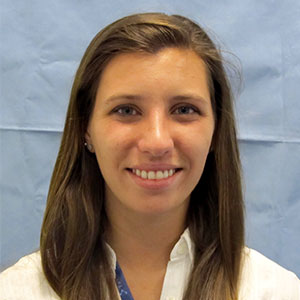 |
Rebecca Neal CulverI initially started off in the Genomes Science and Society Focus, where I was first exposed to a career in scientific research. Since then, the Science and Society Certificate played an important role in solidifying my decision to pursue a research-oriented career in genome sciences. As my Capstone Project, I aided in understanding the challenges of universal genomes, both scientific and political. The project was ultimately very valuable in understanding the societal implications of genomic scientific research. |
|
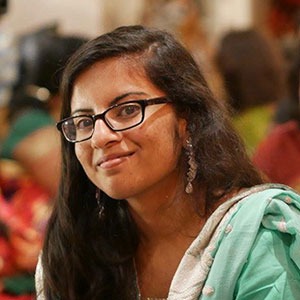 |
Udita Delta GhoshalDelta Ghoshal is a senior majoring in biomedical engineering. She joined the certificate program following her freshman year, when she participated in the Genomes focus program, which was her favorite aspect of the certificate. Meeting new friends and exploring the science and ethics behind genomics in today’s world has been a wonderful experience. Her capstone project, under Dr. Misha Angrist and Dr. Charmaine Royal, has been to work with the National Human Genome Research Institute (NHGRI) to explore the possibility of implementing whole genome sequencing universally into the healthcare of all people in the US, and it has been valuable for fostering connections with stakeholders in precision medicine and for allowing an opportunity to freely explore topics with no clear answers or solutions. The certificate has opened her eyes to the different opinions surrounding genetics and genomics and provided an alternative point of view to her more quantitative engineering training. |
|
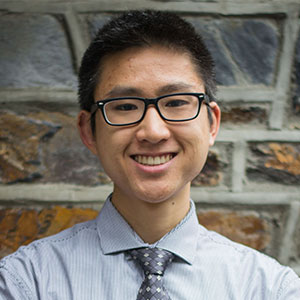 |
Anthony HungI first became involved with the Science and Society certificate through the Genomes FOCUS program in the fall of my first year at Duke. Being able to interact with students and colleagues who were interested in the same aspects of the intersection between science and society was extremely valuable for me, and I continued to build upon those relationships in extracurricular activities, research, and coursework. My main focus was in the area of genetics, and I engaged the topic through investigating the social and legal consequences of noninvasive prenatal testing in the middle east, doing research in a hard science laboratory, and participating in community efforts to engage children in science. Working on my capstone project, which examines the challenges and benefits involved in bringing whole genome sequencing to clinical care, has been valuable in allowing me to dig deep into technical aspects of genomic medicine and the legal atmosphere surrounding these topics. The certificate program allowed me to hone in on my area of interest, giving me an opportunity to develop my interest in genetics well beyond what a major in general biology would have offered. |
|
 |
Mitchell LeeI most enjoyed learning how to disentangle and understand how science both molds and is molded by society and how to communicate science, its guiding ethics, and its impact clearly, efficiently, and persuasively. My development and abilities in those areas culminated while completing a capstone project in which I collaborated with other Science & Society students to investigate and report on how the Geisinger Health System can meaningfully engage its patients as partners in research on how their environments affect their health. I value that project because it helped me to recognize that the knowledge and opinions of non-scientists deserve to be acknowledged and incorporated into scientific endeavors, and to appreciate the positive impact those opinions have on the quality and richness of research. As I progress through my career in research, I plan to apply what I have learned through that project and the Science & Society program toward understanding the impacts of my research and communicating that impact effectively to anyone. |
|
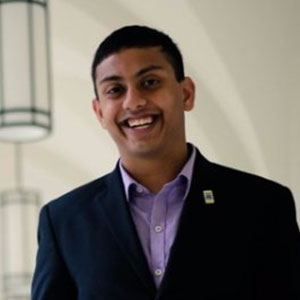 |
Abhiram SankaBefore Duke, I was a passionate political junkie. Although strongly motivated by an intense love for the world that was Washington D.C., I also deeply respected medicine and science given their immense impact upon the human condition. Above all else, however, I enjoyed leadership in the service of others and applying a critical mind towards making a difference. When I came to Duke, these values and interests led me to enroll into the Genomes FOCUS program. The certificate program was a natural extension of this program, featuring a unique blend of science and policy. We developed intimate relationships with our professors, who were part of our Duke journey from start to finish. They taught us how to read, write and think about topics in health sciences policy. In our classes, we critically evaluated varying perspectives and evaluated issues in real time. Our Professors also connected us to people beyond Duke, exposing us to new and exciting professional opportunities outside of the classroom. |
|
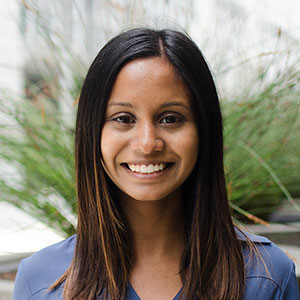 |
Pallavi S. ShankarI became involved in the certificate through the Genomes Focus program and the IGSP Summer Research Fellowship. The summer fellowship was my favorite part of the certificate program, as I was able to experience working in a computational biology lab full-time as well as meet some of my closest friends. I also enjoyed learning more about science policy in the certificate program. For my capstone project, I worked with the National Academies of Medicine Roundtable on Genomics and Precision Health to draft a whitepaper about the return of investment of implementing genomics into medicine. Conducting interviews with stakeholders and researching costs and benefits provided valuable insights about the practical integration of science into society. Because of my experiences in the certificate program, I hope to apply my skills in computational biology and software to solving problems related to genetics in my future career path. |
|
 |
Kay Palopoli-TrojaniWhat I enjoyed the most about the certificate program was the interdisciplinary approach to study the development and implementation of genomic technologies in healthcare. My capstone project involved working with the National Academy of Medicine Genomics and Precision Health Roundtable planning committee for the Economics of Genomic Medicine Workshop. My teammates and I were particularly interested in the economics that accompany the integration of genomic medicine programs across different clinical environments. The certificate has impacted my professional and academic path by highlighting the importance of ethical, legal, and economic considerations that accompany any new scientific discoveries. |
|
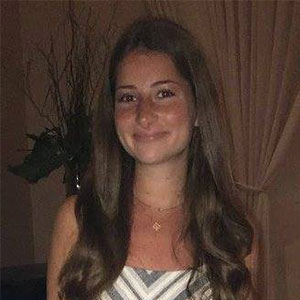 |
Ashley Brooke WarmanI thoroughly enjoyed learning about the field of bioethics, specifically pertaining to genetics and biotechnology. In fact, this certificate has led me down my professional and academic path, for it is through this certificate that I found my admiration for the field of bioethics, which I hope to pursue as my future. For my Capstone Project, myself and other students were paired with Dr. Bob Wildin at the NHGRI to explore universal genomes. This project is valuable to me for I have made many connections to health professionals including individuals at the NHGRI and prominent genomic researchers. In addition, I had the opportunity to work on a project about a topic I am passionate about–genetics. |
|
 |
Brian WeilScience and Society caught my interest immediately because it brought my work in the lab into the context of the always complicated and often ambiguous US policy. I have enjoyed discussing with like-minded peers the nuances of policy surrounding the new frontiers of science. The certificate program has directed my career path away from the lab and into the business and policy of biotechs and biopharmaceuticals – an option I didn’t even consider prior to enrollment. |
|
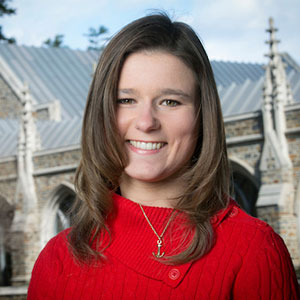 |
Brittany Michelle WengerBeing part of the Science & Society certificate program has been formative during my time at Duke and I know it will continue to shape my research endeavors moving forward. At the beginning of my Duke career, I knew I was passionate about big data analytics in biological contexts. While my research interests remain in the areas of genomics and precision medicine, my coursework with the certificate has helped me think about the implications of this research from different contexts. Because of the certificate, I can evaluate not only the scientific merits of a study but also the legal, bioethical, and societal implications. I think this skill is invaluable for my ability as a responsible scientist and citizen moving forward. Additionally, having the opportunity to work with Dr. Wildin at the NHGRI as a client for my capstone project provided me with valuable real-world experiences and an opportunity to interact with leaders in the field I hope to enter. Finally, I ultimately think my experience as a certificate student was so positive because of the community. Because Science & Society courses are small and taught by professors who genuinely care about students, I have met many of my most influential mentors through this program. |
|

